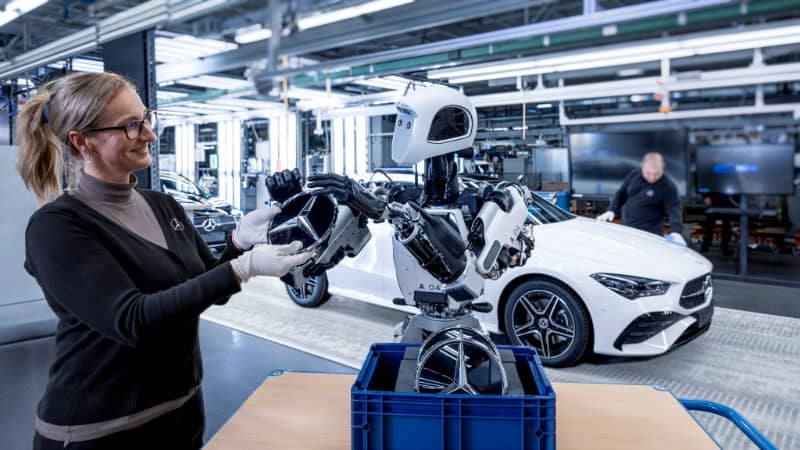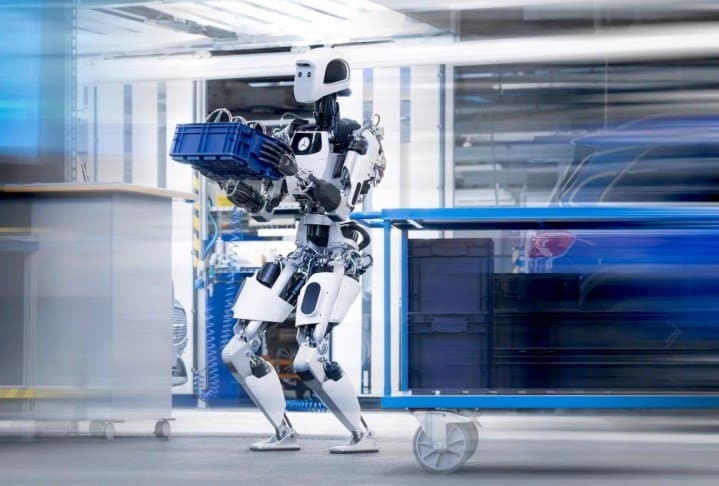In a not too distant future, alongside human workers in car factories we may find new rather unusual "colleagues": humanoid robots. This is what Mercedes-Benz is preparing to experiment with, thanks to a collaboration with the robotics company Apptronik. The target? Use robots to assist workers in the most repetitive and tiring tasks, and not to replace them. An evolution that raises questions about the relationship between man and machine in the world of work of tomorrow.
Apollo, the "all-rounder" robot that comes to Mercedes' rescue
Imagine a tireless, precise and always available colleague. Someone who never complains, doesn't ask for overtime and doesn't go on coffee breaks. Here, you might have just found it: His name is Apollo, is one meter seventy tall, weighs 72 kilos and has an autonomy of 4 hours. Ah, I forgot: it's a humanoid robot. Now, thanks to an agreement with Mercedes-Benz, Apollo is preparing to make its debut on the German giant's production line. His task? Bring components and assembly kits to human workers, relieving them of the most burdensome and repetitive tasks. Or by “unloading the factory” from the workers themselves? The question is pertinent.

It's not a layoff, it's an "upgrading" of the job. They say.
Attention, they explain in Germany: no alarmism. The idea is not to replace flesh-and-blood workers with armies of automatons. Word of Jörg Burzer, a senior executive at Mercedes, who is keen to point out:
The goal is to fill labor shortages for low-skilled, physically demanding and repetitive tasks, and free up our skilled workers for more rewarding tasks.
We trust? In short, no "robotic layoffs" on the horizon, but it would be an "upgrading" of human work. Where have I heard this before? It is certainly a prospect that, at least on paper, seems attractive: less physical effort, more space for creativity and competence. But is it really that simple? Or is there a risk that, in the long run, robots will end up "stealing" more and more tasks from humans?
Not just Mercedes: the future of work in the robot era
My questions, you know, do not have a definitive answer at the moment. And Mercedes is not the only one to explore this frontier: too BMW has entered into a similar agreement with the Californian company figure to bring humanoid robots into its factories. And what about Tesla, which is developing its own Optimus, Or of Xiaomi CyberOne?
Whether we like it or not, robots are preparing to invade our factories (and beyond). Starting from… humanoid robot factories, that someone has already started to set up. A revolution that could radically change the way we conceive of work and the relationship between man and machine. With opportunities to be seized, certainly, but also risks not to be underestimated.
A collaboration to be invented
The point, perhaps, is precisely this: learn to collaborate with these new “colleagues” without being overwhelmed or made superfluous. A delicate balance, which will require not only technological innovation, but also and above all a cultural and organizational rethinking of work. Moreover: of the entire social contract. New skills, new training models, new forms of protection for workers will be needed. But also a new awareness of the irreplaceable value of human intelligence and creativity, which no algorithm will ever be able to fully replicate.
In short, the challenge is open. And Mercedes' experiment with Apollo could be just the beginning of a long journey of exploration and mutual learning between humans and machines. A path that, if well managed, could lead us towards a more sustainable, more inclusive and more rewarding future of work for everyone. Or at least, that's the hope. Because, let's face it, the alternative is a little less rosy: a world where robots do everything and we humans become obsolete. A “Terminator” dystopia that, frankly, we would prefer to avoid.


